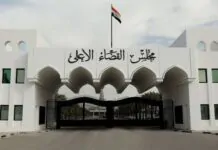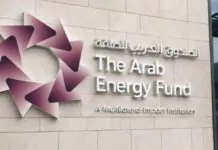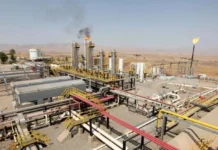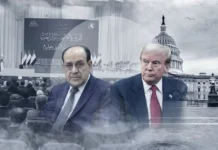An Expert Told Shafaq News: 90 Trillion Dinars Are Hoarded By Iraqis And Do Not Reach The Banks.
Energy and Business 2025-11-02 01:09 Shafaq News – Baghdad Financial expert Mahmoud Dagher revealed on Sunday that The total amount of cash held by the “public” is estimated at around 90 trillion dinars, out of 98 trillion dinars is the size of Iraq‘s money supply.
Dagher, who previously served as a director in The Central Bank of Iraq told Shafaq News Agency that “the volume of currency issued is around 98 One trillion dinars, of which 88 to 90 trillion are held by the public.”
He added, “The public doesn’t just mean people, But rather with merchants, contracting companies, and industrialists,” indicating that “Iraqis They hoard money instead of depositing it in banks, because our society likes to deal in cash.
It takes a long time to get used to electronic payment methods, in addition to the lack of Trust in banks among some depositors after The setbacks that occurred in the banks.
He pointed out that “all these things are considered Behavioral issues; people are accustomed to keeping a portion of their money, and so are companies. Therefore, this is how Iraqis think.”
According to experts, this phenomenon has many aspects The negative aspects include the central bank losing effective control over the money supply. And its tools, such as interest rates or rediscounting, become less effective, while banks suffer.
Financing is hampered by a shortage of liquidity, which weakens its ability to finance projects and pushes investors away.
The shift towards informal financing, coupled with the difficulty of managing inflation due to the large informal sector, The officially circulated information negatively impacts the central bank‘s decisions in achieving its primary objective.
It is about controlling the general price level and achieving stability. https://shafaq.com/ar/اقتصـاد/خبير-لشفق-نيوز-90-ترليون-دينار-مكتنزة-لدى-العراقيين-ولا-تصل-للمصارف
Gold: A Shield Of Safety Against The Fluctuations Of The Global Economy
Economic 2025/11/03 Baghdad: Imad al-Imara Gold reserves represent a safe haven for economic protection and financial stability, and a guarantee against crises and price fluctuations.
The precious metal also has the ability to enhance investor confidence in the national currency, and grant the state independence in the face of economic fluctuations.
It also represents a symbol of economic power and a strategic tool for international transactions.
According to the Prime Minister’s financial advisor, Dr. Mazhar Muhammad Saleh, gold reserves can convey two messages: the first is economic, which is to strengthen the official reserves of the beneficiary state and bolster its monetary cover; the second is political, which is centered on declaring confidence or alliance outside the scope of the dollar, or indicating the possibility of building financial partnerships independent of the American system.
Yellow Metal
Saleh explained, in an interview with Al-Sabah, that “one example of the role of the yellow metal is Russia and China significantly increasing their gold reserves in the last two decades, in compliance with the strategy of gradually decoupling from the dollar, indicating that the relationship between gold and the dollar shows competition and interdependence at the same time.”
He added that Interest rates when gold prices rise, it is often interpreted as a sign of weak confidence in the dollar or fear of inflation in the United States.
When the dollar strengthens, for example by raising US interest rates, gold prices usually fall, because the cost of holding it becomes higher compared to dollar returns.
Petrodollars And Gold
The government advisor attributed the dollar‘s continued dominance after the Nixon shock to the petrodollar agreement that America made with Saudi Arabia in the mid-1970s, whereby oil was priced globally in dollars, thus turning oil into black gold that boosted global demand for the American currency.
He added that as soon as gold entered the scene through speculation in financial markets and futures markets, a new “shadow” monetary system emerged, based on manipulating the inverse relationship between the dollar and basic commodities such as gold, oil, and crops.
Iraq’s Situation
Regarding Iraq‘s situation, the government advisor pointed out that gold represents a limited portion of Iraq‘s official reserves.
He noted that Iraq, as one of the world’s major oil exporters, relies almost entirely on the dollar for pricing its oil exports, and is therefore closely tied to the international monetary system based on the US dollar.
Saleh added that a gold rush or an increase in gold reserves would enhance Iraq‘s ability to diversify its reserve instruments and protect the national economy from dollar fluctuations in global markets, especially in light of financial, political, regional, and international pressures.
He emphasized that the precious metal is a powerful hedge against inflation or a decline in the dollar‘s value, which is crucial for Iraq in managing its future financial surpluses and financing essential investments. Saleh described
A Message To The World
the gold donation as not merely a monetary value, but a symbol of economic sovereignty. He explained that it increases Iraq‘s leverage in financial negotiations and grants it greater flexibility in managing its reserves, reducing its total dependence on the dollar.
He further clarified that any gold donation to Iraq sends a message to the world that the country is striving to bolster its gold reserves as part of a strategic economic diversification policy, not simply to accumulate idle assets. The government advisor argued that, within the current international monetary system, this step provides Iraq with additional flexibility in managing external shocks and reduces its vulnerability to relying solely on the dollar in the face of global fluctuations in oil prices or financial volatility.
Safe Haven
In the same context, Dr. Nagham Hussein, Dean of the College of Business Economics at Al-Nahrain University, agreed with the government advisor’s opinion that both gold and the US dollar are considered safe-haven assets, but they share an inverse relationship with each other.
When the value of the dollar decreases, the demand for gold increases, which leads to a rise in the price of the yellow metal, and vice versa.
Inverse Relationship
Hussain, who attributed the reason to the fact that when the value of the US dollar falls, investors look to other safe-haven assets to invest their money in, and gold occupies a high position on the list of safe investments, noted that this inverse relationship is not very clear in the short term, but in the long term the trend can be easily seen, stressing that the inverse relationship is not always true, as there are times when other factors can affect the prices of gold or the US dollar. https://alsabaah.iq/123137-.html
Arab Bank’s Profits Rise As It Begins Intensive Activity In Iraq
2025 Last updated: November 2, The Independent – The financial results of the Arab Bank Group for the end of the third quarter of 2025 showed the continuation of the strong performance of the Group, with remarkable growth in net profits, assets and deposits, reflecting the strength of its strategy and its effective management of risks and capital.
Net profit after tax reached US$818.1 million,compared to US$748.6 million in the same period last year,representing a 9.3% increase.
The group’s assets also rose to US$76.8 billion, reflecting an 8.9% growth compared to the third quarter of 2024.
Regarding credit activity, the net loan portfolio reached $37 billion, compared to $34.1 billion in the same quarter last year, representing a growth of 8.6%. Customer deposits also increased by 8% to reach $55.8 billion, while shareholders’ equity rose to $12.9 billion, strengthening the Group’s ability to execute its future investment plans.
The bank’s chairman, Sabih al-Masri, affirmed that the strong results reflect the bank’s commitment to its long-term strategy, which focuses on sustainable growth and enhancing efficiency in managing liquidity, capital and risks, while continuing to provide innovative banking services that meet the needs of customers in various markets.
Al-Masri added that the group began operating in the Iraqi market through “Arab Bank Iraq”, as well as implementing a strategy to enhance wealth management and private banking services through the merger of Swiss “Gunet Bank” with Swiss “ONE Bank”.
For her part, the bank’s CEO, Randa Al-Sadiq, said that geographical expansion and diversification of revenue sources played a pivotal role in supporting operational performance, noting that the group maintained good liquidity levels with a loan-to-deposit ratio of 73.2%, while maintaining a non-performing loan coverage ratio exceeding 100%, reflecting the quality of the loan portfolio and the effectiveness of risk management.
Al-Sadiq explained that the bank maintains strong capital, most of which is within core capital, with a capital adequacy ratio of 17.2%,exceeding the minimum required by the Central Bank.
She stressed the importance of investing in digital technologies and developing innovative banking products and services to ensure a distinguished customer experience and achieve sustainable growth in light of the rapid transformations taking place in the banking sector.
These results confirm the Arab Bank’s ability to adapt to economic changes and meet challenges, continuing its growth and expansion at a steady pace and aiming to strengthen its leading position in the markets in which it operates. https://mustaqila.com/أرباح-البنك-العربي-ترتفع-مع-بدء-نشاطه-ا/
For current and reliable Iraqi news please visit: https://www.bondladyscorner.com






